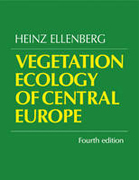
English translation makes this unique book, now in its fourth edition, available to a wider audience. This book is without doubt the most important work ever published about the vegetation of central Europe and its ecology. No other book contains so much ecological information and discusses so many principles relevant not only to plant ecologists in continental Europe, but to ecologistsand palaeoecologists in the British Isles and North America. Besides providing valuable syntheses of the major plant communities, Ellenberg details the ecology and environmental requirements of all the vegetation types and discusses the climatic tolerances and ecological physiology of many of the major species. The account is based upon a life time of thorough field work and experimental investigation. One of the major messages to be gleaned from the book concerns the long-lasting and considerable effects of human activity upon the vegetation, and the book therefore has much to teach about the impact of agriculture and industrial pollution and highlights the need to plan carefully for the conservation of our rich natural and semi-natural environment. INDICE: Foreword; Preface to the first edition; Preface to the second edition; Preface to the third and fourth editions; Part I. Introductory Survey: 1. The vegetation of Central Europe in general; 2. The development of the plantcover under the influence of man; Part II. Near-natural woods and thickets: 1. General view of the central European woodlands; 2. Beech and mixed beech woods; 3. Other deciduous woodland excluding flood plains and mires; 4. Coniferous woodland and mixed woods dominated by conifers; 5. Tree and shrub vegetationof flood plains and peat lands; Part III. Other Near-Natural Formations: 1. The vegetation of fresh water, its banks and springs; 2. Woodland fens and intermediate mires compared with other mire types; 3. Raised bogs and the communities connected with them; 4. Sea marshes and inland saline habitats; 5. Dunes and their vegetation successions; 6. The vegetation above the alpine tree line;7. Plant life in the region of eternal snow; 8. On the epiphytic vegetation in central Europe; Part IV. Formations Created and Maintained Largely by Man's Activities: 1. Arid and semi-arid grasslands in colline and monotane climate; 2. Dwarf-shrub heaths and commons on strongly acid soils; 3. Forestry plantations and woodland clearings; 4. Woodland edges, bushes, hedges and their barbarous margins; 5. Hay and litter meadows; 6. Manured pastures, trodden swards and those subject to flooding; 7. Man-influenced vegetation of muddy ground, lakesides and banks; 8. Ruderal communities of drier sites; 9. Weed communities of arable land, gardens and vineyards; 10. Vegetation development on abandoned land; Tabular summary and index: Bibliography; Remarks on the changes in the system of plant sociology; Summary of the vegetation units and species; SubjectIndex.
- ISBN: 978-0-521-11512-4
- Editorial: Cambridge University
- Encuadernacion: Rústica
- Páginas: 756
- Fecha Publicación: 01/08/2009
- Nº Volúmenes: 1
- Idioma: Inglés
